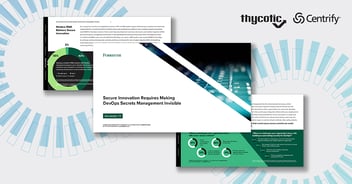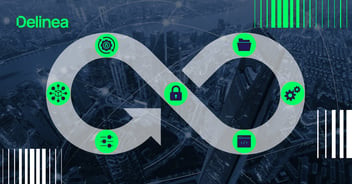New DevOps Secrets Vault release adds key DevOps and RPA integrations

Billy VanCannon
We’ve discussed how DevOps and robotic process automation (RPA) are changing the game in previous blogs. We’re seeing steady growth in requests from our customers to integrate with more and more types of technology solutions, including DevOps and RPA.
For DevOps, we’ve seen it mature to a point where most high-velocity organizations running on modern infrastructure have embraced it and instead of just having a few software releases a year, teams are pushing far more frequent micro releases to accommodate ever more competitive market demands. DevOps pipelines and technology to support them is incredibly complex.
RPA is growing too. It’s an emerging form of business process automation technology based on software robots (bots). Traditional workflow automation tools require software developers to write code to interface with systems to automate tasks. RPA software enables the rest of us to build automated processes through graphical interfaces. It can even do this automatically by recording business users as they perform tasks within a system user interface.
Our latest release of DevOps Secrets Vault includes key new integrations to support organizations adopting DevOps tools and RPA software.
DevOps Secrets Vault is a high velocity vault capable of high-speed secrets creation, archiving, and retrieval. This cloud-based solution is platform agnostic and designed to replace hardcoded credentials in apps for access to other apps, databases, services, DevOps tools, and robotic process automation. This vault ensures IT and DevOps teams the speed and agility needed to stay competitive without sacrificing security.
Ensure security in automation pipelines
RPA bots need to access business-sensitive and possibly confidential data. And because they log in to organizational systems, they need access to passwords and sometimes privileged accounts. Not all RPA implementations have the same checks, balances and security oversight that you see in traditional enterprise development.
With DevOps Secrets Vault integration, robot and third-party secrets for UiPath Orchestrator are stored and automatically provided. This helps mitigate security risks through centralized privileged access management.
Enable secrets access from key DevOps tools and development languages
Cloud services have accelerated the speed and scale of DevOps pipelines, scaling up to tens of thousands of containers, servers, and applications being rapidly deployed across dev, test, and prod environments.
Utilizing DevOps Secrets Vault enables you to adopt enterprise-class secrets management for your DevOps pipelines without the burden of provisioning on-premises or cloud vault instances. The complexity and variety of tools within these pipelines require centralized management of privileged access to maintain security, unify privileged access management, and control costs.
Building on existing integrations with Jenkins and Kubernetes, Delinea DevOps Secrets Vault now offers plug-ins to integrate with:
- HashiCorp Terraform: Enable Terraform to create DSV clients, secrets, and retrieve secrets
- Red Hat Ansible: Enable Ansible to pull DSV secrets automatically
This release also includes software development kits (SDKs) for these programming languages:
- Java
- Go
- Python
- .NET
These SDKs speed up your ability to engage and interact with DevOps Secrets Vault via the API. Most importantly, they allow you to work fast in your preferred programming language without compromising security.
DevOps Secrets Vault is delivered as a service in AWS with a command-line interface and API, which makes getting up and running easy. You don’t have to install a vault or database and Delinea handles all updates. We’ll continue to improve DevOps Secrets Vault and add more integrations. And the CLI, plug-ins, and SDKs are open source, so you have the freedom to add your own customizations too.
You can try DevOps Secrets Vault for free here.
Manage DevOps secrets safely



